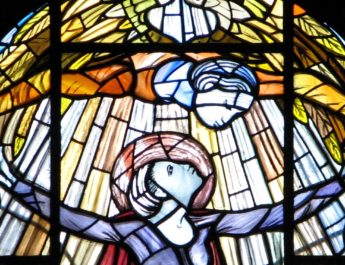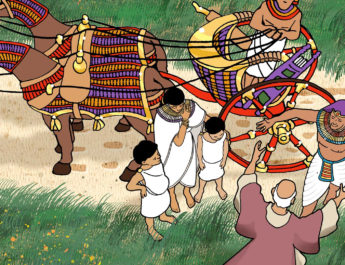Acts 17:22-31
Sixth Sunday of Easter A
22 Then PaulI stoodII in frontIII of the AreopagusIV
I “Paul” = Paulos. From Latin Paulus (small, little). This is Paul or Paulos, meaning little.
II “stood” = histemi. This is to stand, place, establish, appoint, stand ready, be steadfast.
III “front” = mesos. Perhaps from meta (with among, behind, beyond; implies a change following contact or action). This is middle, among, center, midst.
IV “Areopagus” = Areios Pagos. 2x in NT. From ares (Ares, Greek god of war; also called Mars); {from Ionic are (bane, ruin) OR from aros (use, profit, help)} + pagos (hill, mountain peak, frost); {perhaps from pegnumi (to build, fasten, fix)}. This is Areopagus, literally “the Hill of Ares” or “Mars’ Hill.” See https://en.wiktionary.org/wiki/%E1%BC%8C%CF%81%CE%B5%CE%B9%CE%BF%CF%82_%CE%A0%CE%AC%CE%B3%CE%BF%CF%82#Ancient_Greek
V “said” = phemi. From phao (to shine). This is to declare, say, or use contrasts in speaking to shed light on one point of view.
VI {untranslated} = aner. This is man, male, husband, or fellow. It can also refer to an individual.
VII “Athenians” = Athenaios. 2x in NT. From Athenai (Athens, said to be founded by Athena); from Athene (Athena; Greek goddess of wisdom). This is Athenian.
I seeVIII how extremely spiritualIX you are in every way.X
VIII “see” = theoreo. From theaomai (to behold, look upon, see, contemplate, visit); from thaomai (to gaze at a spectacle; to look at or contemplate as a spectator; to interpret something in efforts to grasp its significance); from theoros (a spectator or envoy). This is gazing, beholding, experiencing, discerning. It is looking at something to analyze it and concentrate on what it means. This is the root of the word “theatre” in that people concentrate on the action of the play to understand its meaning.
IX “extremely spiritual” = deisdaimonesteros. 1x in NT. From deisidaimon (fearing the gods); {from deido (to fear) + daimon (evil spirit, demon, fallen angel); perhaps from daio (giving out destinies)}. This is very much fearing or respecting the divine.
X “every way” = pas. This is all or every.
23 For as I went throughXI the city and looked carefullyXII at the objects of your worship,XIII
XI “went through” = dierchomai. From dia (through, across to the other side, thoroughly) + erchomai (to come, go). This is to go through, come, depart, pierce, travel, traverse.
XII “looked carefully” = anatheoreo. Related to “see” in v22. 2x in NT. From ana (up, again, back, among, anew) + theoreo (see note VIII above). This is to gaze at, examine, behold with care or attention. This is to thoroughly consider, dote, pay attention to grasp something more fully.
XIII “objects of…worship” = sebasma. 2x in NT. From sebazomai (to fear, be in awe, worship, adore); from sebo (to worship, revere, adore, be devout; properly this is personally placing a high value on someone or something, showing respect). This is object worship or devotion. For example, it could refer to a god or an altar.
I foundXIV among them an altarXV with the inscription,XVI
XIV “found” = heurisko. This is to find, learn, or obtain. It is to discover something, which generally implies a period of searching for it. This is to find in a literal or figurative sense. This is where the word “heuristic” comes from.
XV “altar” = bomois. 1x in NT. From the same as basis (step, hence foot; a pace); from baino (to walk, to go). This is a platform, stand, or altar.
XVI “inscription” = epigrapho. 5x in NT. From epi (on, upon, to, against, what is fitting) + grapho (to write, describe). This is to write on, inscribe, read. It can be a literal inscription or a mental one.
‘To an unknownXVII god.’XVIII What therefore you worshipXIX as unknown,XX this I proclaimXXI to you.
XVII “unknown” = agnostos. 1x in NT. From a (not, without) + ginosko (to know, recognize, realize, perceive, learn; gaining knowledge through personal experience). This is unknown or unknowable.
XVIII “god” = theos. From Proto-Indo-European origins, meaning do, put, place. This is God or a god in general.
XIX “worship” = eusebeo. Related to “object of…worship” in v23. 2x in NT. From eusebes (pious, devout, God-fearing, respectful); {from eu (good, well) + sebo (see note XIII above)}. This is to worship, be pious, revere, be dutiful. It can be following duty to one’s parents as respecting or supporting. It can be duty towards God as piety or devotion.
XX “unknown” = agnoeo. Related to “unknown” in v23. From a (not, without) + ginosko (see note XVII above). This is unaware not to know. Sometimes it is willful ignorance, but other times it is simply not knowing.
XXI “proclaim” = kataggello. 18x in NT. From kata (down, against, according to, throughout, among, daily) + aggello (to announce, report) {from aggelos (angel, messenger – supernatural or human envoy of God); probably from ago (lead, bring, drive, carry, guide, go)}. This is to proclaim openly and confidently a very specific message. It can also be celebrate, preach, or teach.
24 The GodXXII who madeXXIII the worldXXIV and everythingXXV in it,
XXII “God” = Theos. Same as “god” in v23. See note XVIII above.
XXIII “made” = poieo. This is to make, do, act, construct, abide, or cause.
XXIV “world” = kosmos. Perhaps from the base of komizo (to carry, convey, recover); from komeo (to take care of). This is order, the world, the universe, including its inhabitants. Literally, this is something that is ordered so it can refer to all creation. It can also refer to decoration in the sense that something is better ordered and, thus, made more beautiful. This is where “cosmos” and “cosmetics” come from.
XXV “everything” = pas. Same as “every way” in v22. See note X above.
he who isXXVI LordXXVII of heavenXXVIII and earth,XXIX
XXVI “is” = huparcho. From hupo (by, under, about, subordinate to) + archo (to rule, begin, have first rank or have political power). This is to begin or be ready, to exist or possess. It is what one already has or possesses.
XXVII “Lord” = Kurios. From kuros (authority, supremacy). This is a respectful address meaning master or sir. It refers to one who has control or power greater than one’s own. So, it was also applied to God and Jesus as Master or Lord.
XXVIII “heaven” = ouranos. May be related to oros (mountain, hill); probably related to airo (raise, take up, lift, remove). This is the air, the sky, the atmosphere, and heaven. It is the sky that is visible and the spiritual heaven where God dwells. Heaven implies happiness, power, and eternity.
XXIX “earth” = ge. This is earth, land, soil, region, country, the inhabitants of an area.
does not liveXXX in shrinesXXXI made by humanXXXII hands,XXXIII
XXX “live” = katoikeo. From kata (down, against, throughout, among) + oikeo (to settle or be established somewhere in a permanent way, to make a home or live at home); {from oikos (house – the building, the household, the family, descendants; the temple)}. This is to live or settle on a permanent basis.
XXXI “shrines” = naos. From naio (to dwell, inhabit). This is a place for God (or a god) to live – a sanctuary, shrine, or temple. It is a place for God or a god to manifest. For the Jewish Temple, it is used of the Temple itself and the two inner chambers.
XXXII “human” = anthropinos. Related to {untranslated} in v22. 7x in NT. From anthropos (human, humankind; used for all genders); {probably from aner (see note VI above) + ops (eye, face)}. This is human, in human terms, belonging to humans. It is used to contrast human and vine things.
XXXIII “made by human hands” = cheiropoietos. Related to “made” in v24. 6x in NT. From cheir (hand in a literal sense; figuratively, the means a person uses to accomplish things so it can mean power, means, or instrument); {perhaps from cheimon (winter, storm – winter as the rainy season); related to the base of chasma (chasm, gap, gulf); from chasko (to yawn)} + poieo (see note XXIII above). This is literally made by hand, i.e. artificial. It can also mean to perform.
25 nor is he servedXXXIV by human hands,XXXV as though he neededXXXVI anything,
XXXIV “served” = therapeuo. From therapon (servant, attendant, minister); perhaps from theros (properly heat and so used for summer); from thero (to heat). This is to serve, care, attend, heal, or cure. Since it means to attend to, it can be used for doctors, but also for those who serve God. So, it can mean worship. This is where the word “therapy” comes from.
XXXV “hands” = cheir. Related to “made by human hands” in v24. See note XXXIII above.
XXXVI “needed” = prosdeomai. 1x in NT. From pros (at, towards, for) + deomai (having an urgent need because one is missing or needing something so it is an earnest appeal or pressing request); {from deo (to tie, bind, fasten, impel, compel; to declare something against the law or prohibited)}. This is to need or want additionally.
since he himself givesXXXVII to allXXXVIII mortals lifeXXXIX and breathXL and all things.
XXXVII “gives” = didomi. To give, offer, place, bestow, deliver. This is give in a literal or figurative sense.
XXXVIII “all” = pas. Same as “every way” in v22. See note X above.
XXXIX “life” = zoe. From zao (to live, be alive). This is life including the vitality of humans, plants, and animals – it is life physical and spiritual and life everlasting.
XL “breath” = pnoe. 2x in NT – both in Acts. From pneo (to blow, breathe, breathe hard). This is blowing, wind, breath.
26 From oneXLI ancestor he made all peoplesXLII to inhabitXLIII
XLI “one” = heis. This is one, a person, only, some.
XLII “peoples” = ethnos + anthropos. Ethnos is probably from etho (a custom or culture). This is people who are united by having similar customs or culture. Generally, it is used to refer to Gentiles. This is a tribe, race, nation, or Gentiles in general. This is where the term “ethnicity” comes from. Anthropos is related to {untranslated} in v22 & “human” in v25. See note XXXII above.
XLIII “inhabit” = katoikeo. Same as “live” in v24. See note XXX above.
the wholeXLIV, XLV earth, and he allottedXLVI the timesXLVII
XLIV “whole” = pas. Same as “every way” in v22. See note X above.
XLV {untranslated} = prosopon. Related to “human” in v25 & {untranslated} in v26. From pros (at, towards, with) + ops (see note XXXII above). This is the face, surface, or front. It can imply presence more generally.
XLVI “allotted” = horizo. 8x in NT. From the same as horion (boundary, territory); from horos (limit, boundary). This is to determine, set boundaries, appoint, designate, pre-determined. Literally, this is setting horizons.
XLVII “times” = kairos. This is season, opportunity, occasion. The word chronos is used for chronological time. Kairos is used for spiritually significant time – the right time or appointed time.
of their existenceXLVIII and the boundariesXLIX of the places where they would live,L
XLVIII “existence” = prostasso. 7x in NT. From pros (at, to, toward, with) + tasso (to arrange, appoint, determine). This is to allot, place, appoint, or instruct. This is allotting with a focus on the one who is making the allotment decisions. Figuratively, this can also mean to enjoin.
XLIX “boundaries” = horothesia. Related to “allotted” in v26. 1x in NT. From the same as horion (see note XLVI above) + tithemi (to put, place, set, fix, establish in a literal or figurative sense; properly, this is placing something in a passive or horizontal position). This is definite limit, boundary line.
L “places where…live” = katoikia. Related to “live” in v24. 1x in NT. From kata (down, against, according to, throughout, among, daily) + oikos (see note XXX above). This is dwelling or settlement. It is the act of settling or the place of settlement itself.
27 so that they would searchLI for God and perhapsLII, LIII fumbleLIV about for him and find him—
LI “search” = zeteo. This is to seek, search for, desire. It is searching for something by inquiring or investigation. It can be seek in a literal or figurative sense. There is a Hebrew figure of speech “to seek God’s face” so it can also mean to worship God. Alternately, you could seek someone’s life i.e. plot to kill them.
LII “perhaps” = ara. Related to “heaven” in v24. 18x in NT. From ara (then, since); {perhaps related to aro (to join) or from airo (see note XXVIII above)}. This is a word that cannot be translated. However, it implies a question made from one who is worried or impatient. It can also be surprise or an urgent need for an answer.
LIII {untranslated} = ge. 16x in NT. This is a particle of emphasis – indeed, besides, doubtless, yet, at least.
LIV “fumble” = pselaphao. 4x in NT. Probably from psallo (to twang, play, sing psalms, pluck a stringed instrument such as a harp); {from psao (to rub)} + hapha (to handle). This is to touch, feel, or grope about. It is a light touch to explore, discover, or confirm something with physical contact. It can also figuratively mean search for.
though indeedLV he isLVI not farLVII from eachLVIII one of us.
LV “indeed” = ge. Same as {untranslated} in v27. See note LIII above.
LVI “is” = huparcho. Same as “is” in v24. See note XXVI above.
LVII “far” = makran. 9x in NT. From makros (long, long lasting); from mekos (length); probably related to megas (great or large). This is far off, remote, far away in a literal or figurative sense.
LVIII “each” = hekastos. Perhaps from hekas (separate). This is each one, any, every. It is every individual as a distinct entity as opposed to those counted as a group in small sets.
28 For ‘In him we liveLIX and moveLX and have our being’;LXI as even some of your own poetsLXII have said,
‘For we, too, areLXIII his offspring.’LXIV
LIX “live” = zao. Related to “life” in v25. See note XXXIX above.
LX “move” = kineo. 8x in NT. This is to move, excite, or provoke. It is to stir in a literal or figurative sense. This is where the word “kinetic” comes from.
LXI “have…being” = eimi. This is to be, exist.
LXII “poets” = poietes. Related to “made” & “made by human hands” in v24. 6x in NT. From poieo (see note XXIII above). This is a maker or doer. It can also mean poet, author, or performer. This is where the word “poet” comes from.
LXIII “are” = eimi. Same as “have…being” in v28. See note LXI above.
LXIV “offspring” = genos. From ginomai (to come into being, to happen, become, be born; to emerge from one state or condition to another; this is coming into being with the sense of movement or growth). This is family, offspring, kin – in a literal or figurative sense.
29 “Since we areLXV God’s offspring, we oughtLXVI not to thinkLXVII
LXV “are” = huparcho. Same as “is” in v24. See note XXVI above.
LXVI “ought” = opheilo. Perhaps from the base of ophelos (advantage, gain, profit); from ophello (heaped together, accumulate, increase). This is to be indebted morally or legally – having an obligation one must meet. This term came from the legal world, but was then adopted in reference to morality. In the New Testament it is used for humanity’s ethical responsibility.
LXVII “think” = nomizo. 15x in NT. From nomos (what is assigned – usage, law, custom, principle; used for the law in general or of God’s law; sometimes used to refer to the first five books of the Bible or the entire Old Testament; also used to refer to theology or the practice and tradition of interpreting and implementing the law of God); from nemo (to parcel out, assign). This is to practice, think, consider, suppose, hold by custom. This is thinking that something applies given precedent and practice – to do by law.
that the deityLXVIII isLXIX likeLXX goldLXXI
LXVIII “deity” = theios. Related to “god” in v23. 3x in NT. From theos (see note XVIII above). This is the deity or divine, godlike.
LXIX “is” = eimi. Same as “have…being” in v28. See note LXI above.
LXX “like” = homoios. From the same as homou (together); from homos (the same). This is similar to, resembling, like.
LXXI “gold” = chrusos. 10x in NT. Perhaps from chraomai (to use, make use of, give what is needed, act in a specific way, request). This is gold or something made of gold. It is symbolic of purchasing power.
or silverLXXII or stone,LXXIII an image formedLXXIV
LXXII “silver” = arguros. 5x in NT. From argos (shining). This is silver, whether the metal itself or things made from silver.
LXXIII “stone” = lithos. This is stone in a literal or figurative sense.
LXXIV “image formed” = charagma. 8x in NT. From charasso (to engrave or sharpen) OR from the same as charax (pointed stake, barricade, rampart, trench); from charasso (see above). This is an engraving, stamp, sculpture, or brand mark. It is a mark that shows ownership identification or the mark on a coin or seal.
by the artLXXV and imaginationLXXVI of mortals.LXXVII
LXXV “art” = techne. 3x in NT. From tekton (craftsman; particularly one who works with wood); from the base of timoria (penalty, punishment, vengeance); from timoreo (to punish, protect honor); {perhaps from time (worth or something’s perceived value; literally, price, but figuratively, the honor or value one sees in someone or something else; also esteem or dignity; also precious or valuables); {from tino (to pay, be punished, pay a penalty or fine because of a crime); from tio (to pay respect, value)}} + the base of tikto (to produce, bring forth, beget). This is art, craft, skill, or trade.
LXXVI “imagination” = enthumesis. 4x in NT. From enthumeomai (to think, reflect on, ponder, meditate on; also, passionate mindset, inspirited, moved by a strong impulse); {from en (in, on, at, by, with) + thumos (passion, wrath; actions emerging from passion or impulse) {from thuo (to rush along, breathe violently, offer sacrifice)}}. This is pondering, thoughts, reflection, or deliberation. It focuses on a passionate impulse that impels the thought process.
LXXVII “mortals” = anthropos. Same as “peoples” in v26. See note XLII above.
30 While God has overlookedLXXVIII LXXIXthe timesLXXX of human ignorance,LXXXI
LXXVIII “overlooked” = hupereidon. 1x in NT. From huper (by, under, over, above, under the authority of another) + eidos (form, shape, sight, appearance); from eido (to be aware, see, know, remember, appreciate). This is to disregard, not notice, wink at.
LXXIX {untranslated} = men. This is truly, indeed, even, in fact. Often, it is not translated, but used to emphasize affirmation.
LXXX “times” = chronos. Time in the chronological sense, quantitative time or a duration of time.
LXXXI “ignorance” = agnoia. Related to “unknown” & “unknown” in v23. 4x in NT. From agnoeo (see note XX above). This is ignorance, whether inadvertent or willful blindness.
now he commandsLXXXII all peopleLXXXIII everywhereLXXXIV to repent,LXXXV
LXXXII “commands” = paraggello. Related to “proclaim” in v23. From para (from beside, by) + aggello (see note XXI above). This is to send a message, order, notify, command. It is a charge – a proper command as a military term that has followed proper channels. It can also mean to entreat solemnly.
LXXXIII “people” = anthropos. Same as “peoples” in v26. See note XLII above.
LXXXIV “everywhere” = pantachou. Related to “every way” in v22. 8x in NT. Perhaps from pas (see note X above). This is in all places.
LXXXV “repent” = metanoeo. Related to “unknown” & “unknown” in v23 & “ignorance” in v30. From meta (with, among, after, beyond) + noieo (to perceive, think, understand); {from nous (mind, understanding, reasoning faculty, intellect, capacity to reflect); from ginosko (see note XVII above)}. This is to change how one thinks, to reconsider, to repent. It refers to a change of thinking, which means a change of purpose and behavior.
31 because he has fixedLXXXVI a dayLXXXVII on which he will haveLXXXVIII the worldLXXXIX
LXXXVI “fixed” = histemi. Same as “stood” in v22. See note II above.
LXXXVII “day” = hemera. Perhaps from hemai (to sit). This is day, time, or daybreak.
LXXXVIII “have” = mello. Perhaps from melo (something that one is worried or concerned about, something one pays attention to or thinks about). Properly, this is ready, about to happen, to intend, delay, or linger. This is just on the point of acting.
LXXXIX “world” = oikoumene. Related to “live” in v24 & “places where…live” in v26. 15x in NT. From oikeo (see note XXX above). This is the world – the part where people live. It was used specifically for the Roman world. It is the root of the word “ecumenic.”
judgedXC in righteousnessXCI by a manXCII whom he has appointed,XCIII
XC “judged” = krino. To judge, decide, think good, condemn, determine, pass judgment, stand trial, sue. This is judging whether it is done in court or in a private setting. Properly, it refers to mentally separating or distinguishing an issue – to come to a choice or decision, to judge positively or negatively in seeking what is right or wrong, who is innocent or guilty. It can imply trying, condemning, punishing, or avenging.
XCI “righteousness” = dikaiosune. From dikaios (correct, righteous – implies innocent; this is that which conforms to God’s notion of justice, uprightness); from dike (the principle of justice; that which is right in a way that is very clear; a decision or the execution of that decision; originally, this word was for custom or usage; evolved to include the process of law, judicial hearing, execution of sentence, penalty, and even vengeance; more commonly, it refers to what is right); may be from deiknumi (to show, point out, exhibit; figurative for teach, demonstrate, make known). This is judicial or divine approval of character or action. This is righteousness, justice, justness, divine righteousness.
XCII “man” = aner. Same as {untranslated} in v22. See note VI above.
XCIII “appointed” = horizo. Same as “allotted” in v26. See note XLVI above.
and of this he has givenXCIV assuranceXCV to all by raisingXCVI him from the dead.”XCVII
XCIV “given” = parecho. 16x in NT– including Luke 6:29: “if anyone strikes you on the cheek, offer the other also.” From para (beside, by, in the presence of) + echo (to have, hold, possess). This is present, to show, bring, give, offer to hold near.
XCV “assurance” = pistis. From peitho (to have confidence, urge, be persuaded, agree, assure, believe, have confidence, trust). This is less about knowing, believing, and repeating a list of doctrines then it is about trusting God. Faith means listening to God and seeking to live a holy life even (and especially) when we don’t understand how everything works or fits together. Faith is about being faithful (trusting and doing) rather than being all knowing.
XCVI “raising” = anistemi. Related to “stood” in v22. From ana (upwards, up, again, back, anew) + histemi (see note II above). This is to raise up, rise, appear. It is to stand up literally or figuratively. Can also mean to resurrect.
XCVII “dead” = nekros. Perhaps from nekus (corpse). This is dead or lifeless, mortal, corpse. It can also be used figuratively for powerless or ineffective. It is where the word “necrotic” comes from.
Image credit: “Athens: Altar to the ‘Unknown God'” by John Goodinson of FreeBibleImages.




